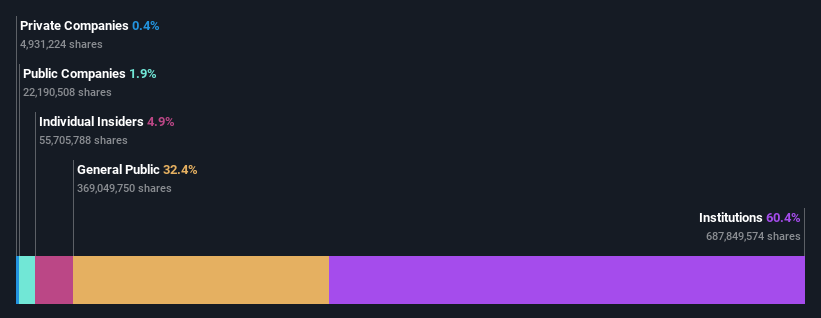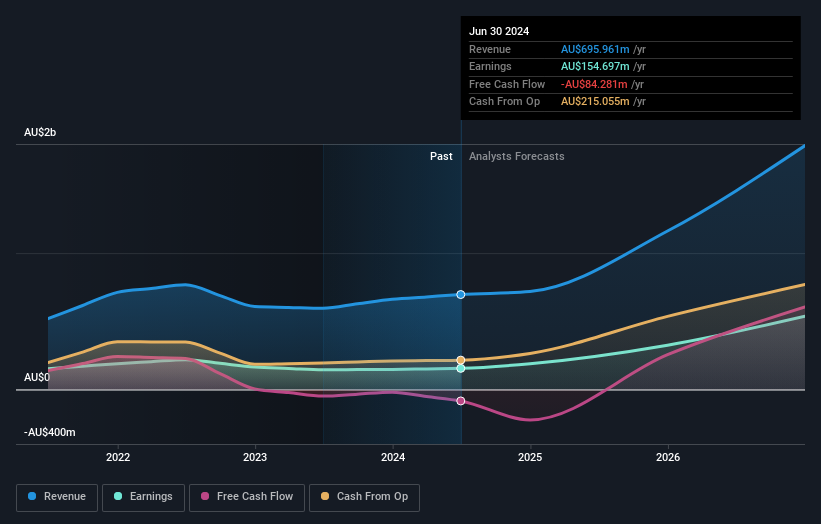- Australia
- /
- Metals and Mining
- /
- ASX:WAF
West African Resources Limited's (ASX:WAF) large institutional owners must be happy as stock continues to impress, up 7.6% over the past week

Key Insights
- Significantly high institutional ownership implies West African Resources' stock price is sensitive to their trading actions
- A total of 11 investors have a majority stake in the company with 51% ownership
- Insiders have been selling lately
To get a sense of who is truly in control of West African Resources Limited (ASX:WAF), it is important to understand the ownership structure of the business. With 60% stake, institutions possess the maximum shares in the company. Put another way, the group faces the maximum upside potential (or downside risk).
And last week, institutional investors ended up benefitting the most after the company hit AU$1.9b in market cap. One-year return to shareholders is currently 72% and last week’s gain was the icing on the cake.
Let's delve deeper into each type of owner of West African Resources, beginning with the chart below.
Check out our latest analysis for West African Resources

What Does The Institutional Ownership Tell Us About West African Resources?
Many institutions measure their performance against an index that approximates the local market. So they usually pay more attention to companies that are included in major indices.
As you can see, institutional investors have a fair amount of stake in West African Resources. This suggests some credibility amongst professional investors. But we can't rely on that fact alone since institutions make bad investments sometimes, just like everyone does. If multiple institutions change their view on a stock at the same time, you could see the share price drop fast. It's therefore worth looking at West African Resources' earnings history below. Of course, the future is what really matters.

Institutional investors own over 50% of the company, so together than can probably strongly influence board decisions. We note that hedge funds don't have a meaningful investment in West African Resources. L1 Capital Pty. Limited is currently the company's largest shareholder with 8.9% of shares outstanding. For context, the second largest shareholder holds about 8.7% of the shares outstanding, followed by an ownership of 5.0% by the third-largest shareholder. Furthermore, CEO Richard Hyde is the owner of 1.5% of the company's shares.
A closer look at our ownership figures suggests that the top 11 shareholders have a combined ownership of 51% implying that no single shareholder has a majority.
Researching institutional ownership is a good way to gauge and filter a stock's expected performance. The same can be achieved by studying analyst sentiments. There is some analyst coverage of the stock, but it could still become more well known, with time.
Insider Ownership Of West African Resources
The definition of company insiders can be subjective and does vary between jurisdictions. Our data reflects individual insiders, capturing board members at the very least. Company management run the business, but the CEO will answer to the board, even if he or she is a member of it.
I generally consider insider ownership to be a good thing. However, on some occasions it makes it more difficult for other shareholders to hold the board accountable for decisions.
We can see that insiders own shares in West African Resources Limited. It is a pretty big company, so it is generally a positive to see some potentially meaningful alignment. In this case, they own around AU$91m worth of shares (at current prices). It is good to see this level of investment by insiders. You can check here to see if those insiders have been buying recently.
General Public Ownership
The general public, who are usually individual investors, hold a 32% stake in West African Resources. While this group can't necessarily call the shots, it can certainly have a real influence on how the company is run.
Next Steps:
It's always worth thinking about the different groups who own shares in a company. But to understand West African Resources better, we need to consider many other factors. To that end, you should learn about the 3 warning signs we've spotted with West African Resources (including 1 which is a bit unpleasant) .
Ultimately the future is most important. You can access this free report on analyst forecasts for the company.
NB: Figures in this article are calculated using data from the last twelve months, which refer to the 12-month period ending on the last date of the month the financial statement is dated. This may not be consistent with full year annual report figures.
Valuation is complex, but we're here to simplify it.
Discover if West African Resources might be undervalued or overvalued with our detailed analysis, featuring fair value estimates, potential risks, dividends, insider trades, and its financial condition.
Access Free AnalysisHave feedback on this article? Concerned about the content? Get in touch with us directly. Alternatively, email editorial-team (at) simplywallst.com.
This article by Simply Wall St is general in nature. We provide commentary based on historical data and analyst forecasts only using an unbiased methodology and our articles are not intended to be financial advice. It does not constitute a recommendation to buy or sell any stock, and does not take account of your objectives, or your financial situation. We aim to bring you long-term focused analysis driven by fundamental data. Note that our analysis may not factor in the latest price-sensitive company announcements or qualitative material. Simply Wall St has no position in any stocks mentioned.
About ASX:WAF
West African Resources
Engages in the mining, mineral processing, acquisition, exploration, and project development of gold projects in West Africa.
Exceptional growth potential with flawless balance sheet.


